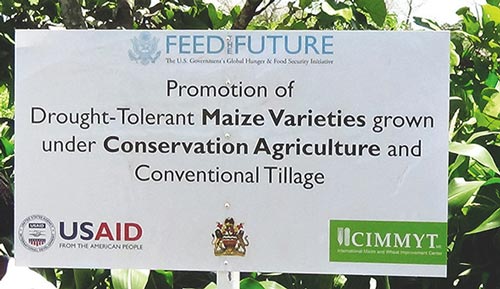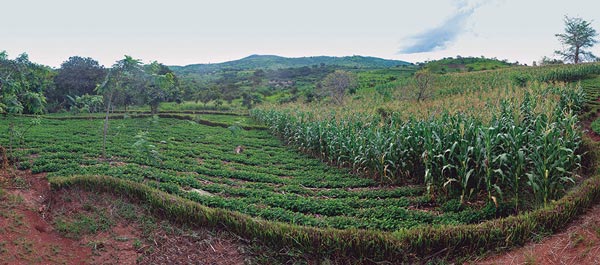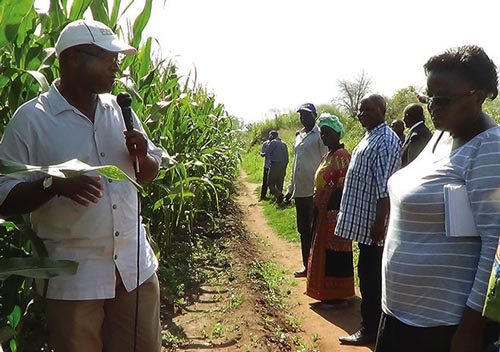Malawi’s Principal Secretary for Agriculture, Erica Maganga, led a delegation of Government Principal Secretaries and seed company representatives to Mpilisi and Ulongue in Balaka District on 11 March to observe progress in conservation agriculture (CA) adoption, as part of the country’s Agriculture Sector Wide Approach Program (ASWAP).

“CIMMYT is on the forefront in promoting different options to farmers… previous challenges will now not be an issue here as farmers have been exposed to different solutions,” said Maganga, after seeing the benefits of a trial in Ulongue where maize is grown under CA using different types of residues. Over the last several years the country has actively pursued CA, implementing practices that include eliminating traditional ridge-and-furrow tillage systems, keeping crop residues and rotating maize with leguminous crops.
Malawi is smaller than the state of Pennsylvania, yet supports 17.4 million people, half of whom live below the poverty line. Global climate change has disrupted the country’s traditional rain cycles, resulting in longer droughts or extreme floods. Maize is Malawi’s primary food crop, but unpredictable weather causes longer “hungry seasons” – the months until the next maize harvest, after the previous year’s grain has been eaten. With 85% of Malawian farmers depending upon rain-fed agriculture, erratic weather jeopardizes food security and livelihoods.

The Malawian government and farmers are working vigorously to address climate variability and support projects in affected communities. One example is Tiyanjane Nutrition Group, a beneficiary of CIMMYT’s ReSEED Maize Project funded by USAID. The group is involved in small-scale farming, value addition and sale of baked goods. Farmers use the proceeds to help orphans and other people in need and to buy inputs for better farming.
“CIMMYT through ReSEED is demonstrating drought-tolerant maize varieties to farmers,” Maganga said. “I want to urge seed companies to be proactive in providing these new maize varieties to farmers.”
The delegation also visited farmers who adopted CA practices such as intercropping pigeonpea with maize. Other demonstrations showcased crop diversification, promotion of indigenous crops, nutrient management, good agriculture practices and construction of infiltration pits and lowland tracts to manage water runoff and filter pollutants.

Agriculture Erica Maganga looking on.
The high-level delegation included representatives from the Ministry of Agriculture, Irrigation and Water Development, the Principal Secretary for Trade and Industry, the Principal Secretary for Finance, the Principal Secretary for Transport and Public Works, the Principal Secretary for Local Government and Infrastructure Development, the Principal Secretary for Lands and Housing Development, the Principal Secretary for Nutrition, HIV & AIDS, the Principal Secretary for Youth, and the Principal Secretary for Economic Planning and Development. Seed companies including Monsanto, Pannar Seed, Chemicals and Marketing Company, Total LandCare Malawi and Self Help Africa also participated.
 Climate adaptation and mitigation
Climate adaptation and mitigation 
